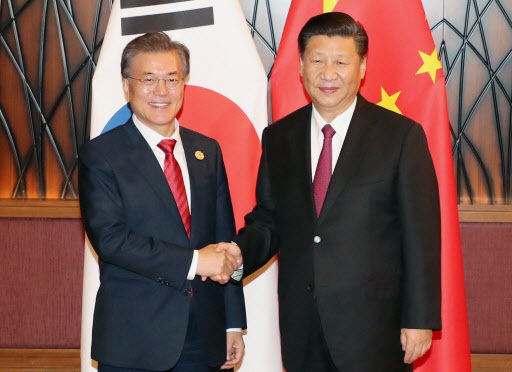Leaders of S. Korea, China mend ties, reaffirm efforts to denuclearize N. Korea
By Choi He-sukPublished : Nov. 11, 2017 - 20:48
The leaders of South Korea and China on Saturday reaffirmed joint efforts to peacefully resolve North Korea’s nuclear threat, highlighting the recent normalization of bilateral ties estranged by the deployment of a US missile defense system in South Korea.

At a summit, the leaders “shared the view on the need to stably manage the current security condition on the Korean Peninsula in relation to North Korea’s nuclear and missile programs and agreed to peacefully resolve the North Korean nuclear issue through dialogue,” Seoul’s presidential office Cheong Wa Dae said of the meeting between South Korean President Moon Jae-in and Chinese President Xi Jinping.
To this end, the two countries agreed to strengthen their strategic dialogue.
The leaders also agreed to continue their discussions next month when the South Korean president will make a trip to China for their third bilateral summit, according to Cheong Wa Dae.
Moon asked the Chinese leader to reciprocate his scheduled visit with a trip to South Korea during the 2018 PyeongChang Winter Games in February. Xi said he would try his best and would send a high-level delegation if he was unable to attend.
The Moon-Xi meeting came after a monthslong dispute caused by China’s protest against the deployment of the Terminal High Altitude Area Defense anti-missile system in South Korea.
“I am very glad to see you again after four months,” Moon said at the start of the bilateral summit held on the sidelines of the Asia-Pacific Economic Cooperation Economic forum in Vietnam.
The two leaders last met in Berlin in July before the Group of 20 summit in Hamburg, Germany.
“Also, I am glad that our two countries have agreed to normalize exchanges and cooperation in all areas,” he added, according to Cheong Wa Dae pool reports.
The latest South Korea-China summit came after the countries agreed to normalize ties in an agreement issued on Oct. 31.
Xi said the Oct. 31 agreement marked a “new start and a good beginning.”
“While welcoming the agreement released Oct. 31, the two leaders agreed to quickly put the countries’ exchange and cooperation in all areas back on the normal track,” Moon’s chief press secretary Yoon Young-chan told a press briefing.
Xi noted his meeting with the South Korean leader marked a turnaround in South Korea-China relations.
“I believe our meeting today will be a great opportunity for the development of the relationship between the two countries and their cooperation and leadership on issues regarding the Korean Peninsula,” he told Moon through his interpreter.
The Chinese president also underscored the importance of South Korea-China relations, saying the conditions on the Korean Peninsula were at a “pivotal” juncture.
Saturday’s meeting took place about two months after North Korea staged its sixth and most powerful nuclear test so far on Sept. 3.
Meanwhile, Cheong Wa Dae said the country has also asked the Chinese side to handle North Korean defectors in China with a humanitarian approach, a request apparently seeking the passage of North Korean defectors to South Korea. The request was part of a high-level dialogue held shortly before the Moon-Xi summit.
However, the meeting was followed by a brief commotion following a Chinese news report.
China’s Xinhua News Agency reported later in the day that Xi had urged Seoul to make a “responsible decision” regarding THAAD. Cheong Wa Dae responded to the report by saying that the comment was within the boundaries of the joint statement from South Korean and Chinese foreign ministries on Oct. 31. In the statement, Seoul stated that the THAAD deployment is solely for defense against North Korea, while China reiterated its opposition to the system’s presence in South Korea.
By Choi He-suk and news reports



![[AtoZ into Korean mind] Humor in Korea: Navigating the line between what's funny and not](http://res.heraldm.com/phpwas/restmb_idxmake.php?idx=644&simg=/content/image/2024/04/22/20240422050642_0.jpg&u=)
![[Exclusive] Korean military set to ban iPhones over 'security' concerns](http://res.heraldm.com/phpwas/restmb_idxmake.php?idx=644&simg=/content/image/2024/04/23/20240423050599_0.jpg&u=20240423183955)


![[Graphic News] 77% of young Koreans still financially dependent](http://res.heraldm.com/phpwas/restmb_idxmake.php?idx=644&simg=/content/image/2024/04/22/20240422050762_0.gif&u=)

![[Herald Interview] Why Toss invited hackers to penetrate its system](http://res.heraldm.com/phpwas/restmb_idxmake.php?idx=644&simg=/content/image/2024/04/22/20240422050569_0.jpg&u=20240422150649)






![[Exclusive] Korean military to ban iPhones over security issues](http://res.heraldm.com/phpwas/restmb_idxmake.php?idx=652&simg=/content/image/2024/04/23/20240423050599_0.jpg&u=20240423183955)



![[Today’s K-pop] Ateez confirms US tour details](http://res.heraldm.com/phpwas/restmb_idxmake.php?idx=642&simg=/content/image/2024/04/23/20240423050700_0.jpg&u=)